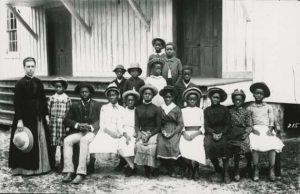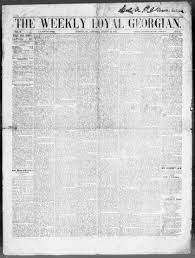The Educational column of the Loyal Georgian written August 24th of 1867 describes a teachers festival in which the educators sent to the south by the New England Freedmen’s Society get together to celebrate the education of the recently freedmen in various locations in the south such as Atlanta, Chattanooga, Nashville, and Memphis (“Teacher’s Festival”). At this event, it is described that at least two “Negro Spirituals” were sung by various attendees of the event. One of the spirituals was sung by a mother and daughter with the lyrics “I think I see sister Hannah, I know her by her garments, She’s a blessing in the land.” (“Teacher’s Festival”). The title has proven difficult to find, but the story of Hannah is frequently used as a demonstration of the good fortune given by God (Klein). All members of the group concluded their meeting with the Hymn “Old Hundredth” also known as “All People Who on Earth do Dwell” (“Teacher’s Festival”, “Tune: Old Hundredth”).
Though the event itself did not have a musical nor necessarily spiritual focus, these pieces of music added great joy, celebration, and fellowship for those in attendance. This Teacher’s Festival was happening to celebrate the work of those educators in the south during Civil War Reconstruction (“Teacher’s Festival”). This event in itself is significant because it is one of the few positive effects of Reconstruction (freed people getting education) and it’s very important both musically and historically to acknowledge the fact that African Americans were celebrating other African Americans with black music. This was not a performance for an audience but rather an act of fellowship for a group of people that had known and would continue to know great hardship.
This article brings to mind the words of W.E.B Du Bois when he said “They came out of the South, unknown to me, one by one, and yet at once I knew them as of me and of mine.” (Du Bois). It is clear both in this column and for Du Bois that this music was of great importance in passing along and celebrating black community.
Sources
Klein (Abensohn), Lillian. “Hannah: Bible.” Shalvi/Hyman Encyclopedia of Jewish Women. 31 December 1999. Jewish Women’s Archive. (Viewed on October 11, 2022) <https://jwa.org/encyclopedia/article/hannah-bible>.
Parkman, John, and W.E Stevenson. “Appointment: The New England Freedmen’s Aid Society, a Teacher of Freed People in North Carolina.” North Carolina Digital Archives, CONTENTdm, digital.ncdcr.gov/digital/collection/p15012coll8/id/10779/.
“Teacher’s Festival.” Daily Loyal Georgian, 24 Aug. 1867, p. 3.
“Tune: Old Hundredth.” Old Hundredth, Hymnary.org, hymnary.org/tune/old_hundredth_bourgeois.
W.E.B. Du Bois. “”The Sorrow Songs,” from The Souls of Black Folk”. Book excerpt, 1903. From Teaching American History. https://teachingamericanhistory.org/document/the-sorrow-songs/ (accessed October 11, 2022).


